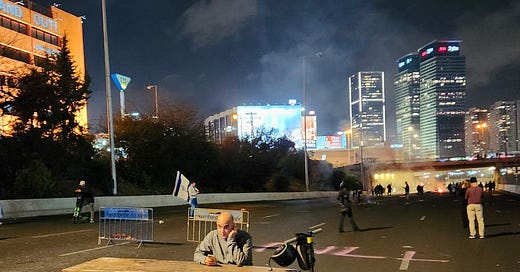

Discover more from Israel from the Inside with Daniel Gordis
Israel’s closing the skies to American Jews—violating a sacred relationship?
Might COVID finally get us to have the conversation we’ve been avoiding for three quarters of a century?
When Prime Minister Naftali Bennett, doing his best to delay the inevitable Omicron wave, tried to buy time by closing Israel’s skies, he aroused the ire of several groups, including the Israeli tourism industry and … American Jews. The difference in perspective between the two communities could be easily seen in two headlines in the Jerusalem Post. The first, “Bennett: Diaspora is ‘close to my heart,’ but no travel exceptions” was followed by William Daroff, the exceptionally thoughtful CEO of the Conference of Presidents of Major American Jewish Organizations, who wrote a measured column in the Post, which the Post summarized with the headline, “Covid-19 suspends the implicit Israel-Diaspora covenant.”
These different attitudes to the relationship have a long history, and we’re obviously not going to settle that contentious and often painful issue in this setting. What many people don’t realize, though, is the great lengths to which the two communities have gone not to have the honest conversation we’ve long needed. In fact, the drive to avoid the discussion is as old as the State of Israel itself.
We can see the obfuscation even in a very common mistranslation of Israel’s Declaration of Independence. Go to the Knesset website, and you’ll find this (in the penultimate paragraph):
§ 18 We appeal to the Jewish people throughout the Diaspora to rally round the Jews of Eretz-Israel in the tasks of immigration and upbuilding and to stand by them in the great struggle for the realization of the age-old dream - the redemption of Israel.
That’s all well and good, except for that fact that, well, that’s not what the Hebrew says.
The Hebrew verb lehitlaked does not mean to “rally around,” which one can do from New York, Paris or London. It means to become “one physical body with.” Nor does “in the tasks of” really appear in the Hebrew. Those words are rendered in Hebrew by a simple letter, the letter bet, which means “by.” Nor does the Hebrew really say “we appeal.” It says “we call upon.” In other words, what the Hebrew says was “we call upon the Jewish people in the Diaspora to become one with the Jews of Eretz-Yisrael by immigrating and building and to stand by them in the great struggle for the realization of the age-old dream - the redemption of Israel.”
The intentionally loose translation, obviously, is much more palatable to Jews outside of Israel, the overwhelming majority of whom never had any intention of picking up and going to fight alongside the yishuv in the War of Independence.
(If you have not seen Nancy Spielberg’s movie, Above and Beyond, about the American Jewish pilots who did just that, it is an absolute must.)
Yet if the Hebrew seems kind of “in your face,” it’s worth noting that it’s actually a much toned-down version of early drafts by two of the foremost leaders of the yishuv, Moshe Shertok and Zalman Shazar.
On May 12th, two days before the declaration of Israel’s creation and thus close to the end of the editing process, the version that Moshe Shertok (who would later change his name to Moshe Sharett and would become Israel’s second Prime Minister) had proposed said: “We appeal to the Jewish people throughout the world to become one with the fighting yishuv and to volunteer to assist it in this heavy campaign the realization of the dream of generations.”
What Sharett called a “heavy struggle”, Ben-Gurion toned down to “great struggle.” Yet while Shertok wrote the “dream of generations,” Ben-Gurion upped the ante and said clearly what the campaign was for. It was not only about “realizing the dream of generations”; it was about the salvation of the Jewish people.
Even Shertok’s language was a toning down of a previous version. On April 12th, a month earlier, in his speech that served as an unofficial draft of the Declaration, Shneur Zalman Rubashov (who would later change his name to Zalman Shazar, eventually becoming Israel’s third president) had said:
And the dispersed people of Israel throughout the world, refugees of disasters and bearers of hopes, whose campaign is the campaign now spreading in the Land and which is being conducted for their future, must now reveal the wellsprings of loyalty and love, and the yearning for salvation burst from the reservoirs in which it has been hidden, and must become one with the people battling for its liberation and for the future of our independence.
Shazar called Jews of the Diaspora “refugees of disasters and bearers of hope,” noting that the military campaign spreading throughout the land was being conducted for their future. American Jews certainly did not see things that way. Shertok and Ben-Gurion toned down “refugees of disasters” to “the Jewish people around the world.” Shazar said that the battle was over the “future of our independence.” Shertok changed that to “the realization of the dream of generations.” Ben-Gurion, as we noted, said what he thought was really at stake—the redemption of the Jewish people.
Zionism’s leaders believed that Jews who felt part of the Jewish people ought now reveal the wellsprings of love, the determination to contribute to the salvation of the Jewish people, and join—physically—the battle at hand.
That did not happen, of course. By the early 1950’s, when the battles had subsided but immigrants from places like America (where Jews faced no oppression that they needed to flee) had not come, an anguished Ben-Gurion wrote, “For hundreds of years, a question-prayer hovered in the mouths of the Jewish people: Would a country be found for this people? No one imagined the frightening question: Would a people be found for the country when it would be created?”1
What is really at stake in the (mis)translation? Israel’s Declaration of Independence was not calling for a partnership; it was calling for an end to the Diaspora and for massive immigration of Jews to Israel, not only from lands where they were oppressed, but from lands where they were fully integrated and accepted. That, those Zionist founders believed, was the essence of the age-old-dream.
An end to the diaspora? Really!? Really.
It would be impossible to overstate the centrality of Jewish immigration to the founders’ vision of the state. The declaration makes this clear earlier, long before it gets to paragraph 18, which we discussed above. In paragraph 13, the declaration sees immigration not as a policy, but as a very tenet of the society the Jewish state would be.
§ 13 The State of Israel will be open for Jewish immigration and for the Ingathering of the Exiles; it will foster the development of the country for the benefit of all its inhabitants; it will define itself in relation to freedom, justice and peace as envisaged by the prophets of Israel.
When listing the characteristics of the new state, “immigration” came even before “freedom, justice and peace.”
This vision of Israel was bound to cause friction between the newfound state, which was home to 600,000 Jews, and the American Jewish community in particular, which numbered, depending on whom one asked, between four and a half and five million.2
The American Jewish community was seven or eight times as large as that of Israel; there were three times more Jews in the city of New York alone than there were in the entire Jewish state!
Yet David Ben-Gurion continuously spoke about his tiny fledgling country as the new center of the Jewish world and urged American Jews to pick up and make the new state their home, precisely as the Declaration had declared that they should.
Not surprisingly, American Jewish leaders were incensed. In the few generations since the massive immigration of Eastern European Jews to America (1880-1924), they had created a thriving and increasingly secure and established Jewish community, welcomed by the host population in a way that no previous Jewish population had ever been welcomed. Of course there was anti-Semitism in America, and of course Jews had yet to make their way to the top echelons of all walks of American life. But the progress had been extraordinary, and American Jews were embracing the opportunities America afforded them wholeheartedly, with no sense of split loyalties. Though the American Jewish community had been deeply split about Zionism just a few decades earlier, now that news of what had transpired during the Holocaust was spreading, now that there were still hundreds of thousands of Jewish displaced persons in Europe who needed a home and now that Israel was already a fact and not merely an idea, they supported Israel, often passionately.
But that did not mean that they had any intention of making Israel their home. Why should they? Ben-Gurion had every right to his dream and his vision, but so, too, did American Jews.
While those observers who claim that Benjamin Netanyahu was responsible for breaking the camel’s back when it came to ending bipartisan support for Israel in the United States and thus for causing a rupture with much of the American Jewish left are largely correct, it bears noting—in fairness to Netanyahu—that the relations had been strained from the very moment Israel got off the ground. Ben-Gurion was the one who launched the acrimony, and almost all of Israel’s leaders at the time agreed with him.
Jacob Blaustein, who was the the President of the American Jewish Committee (at that point the most powerful American Jewish organization), minced no words in telling Ben-Gurion—and thus, all of Israel—that their expectation of massive American immigration to Israel was not only foolhardy, but offensive. In a speech to the leadership of the AJC, he said:3
American Jews—young and old alike—Zionists and non-Zionists alike—are profoundly attached to this, their country. America welcomed our immigrant parents in their need. Under America’s free institutions, they and their children have achieved that freedom and sense of security unknown for long centuries of travail. We have truly become Americans, just as have all other oppressed groups that have ever come to these shores.
We repudiate vigorously the suggestion that American Jews are in exile. The future of American Jewry, of our children and our children’s children, is entirely linked with the future of America. We have no alternative; and we want no alternative.
Naftali Bennett and William Daroff are thus implicitly continuing a conversation that the Jewish world has had—but never sufficiently openly—for almost three quarters of a century. Citizenship versus non-citizenship has never adequately captured the relation between the two communities, but we have never spent much time speaking openly about what the obligations and prerogatives of each community on opposite sides of the Atlantic ought to be.
The horrors of Covid are obvious; but so, too, have been some of the unexpected social and workplace silver linings of the pandemic. For Jews, the implicit conversation between Bennett and Daroff is long overdue. Might the challenges of Covid ironically create the moment when visionary and honest leaders on both sides of the divide finally begin the conversation—about Israel, the Diaspora and the nature of the relationship—that we’ve never really had?
Due to the long New Year’s Day weekend in the US, we’re posting the weekly column this week on Tuesday, as we noted we would. Next week, we return our regular schedule, with the written column on Monday and the podcast posted on Thursday.
Monday’s column will be on the infamous Deir Yassin massacre, the one everyone loves to talk about. What wait … what if the massacre never happened? That’s precisely what a new book claims, and we’re going to look at that argument, and why it matters.
In Thursday’s podcast, we’re in conversation with Yotam Polizer, the CEO of IsraAid, an Israeli organization that helps people in disaster areas all across the world. What motivates Israelis to respond this way? What does their work say about Israel’s ethos?
And lots more coming after that, including a conversation with Natalie Marcus, one of the writers of the next season of Fauda, and Teheran, and The Jews are Coming.
Wishes to all for a healthy and successful 2022!
Our twitter feed is here; feel free to join there, too
David Ben-Gurion, Chazon ve-Derekh [Vision and Path] (Tel Aviv: Workers Party of the Land of Israel, 1953), 300–301. The translation from the Hebrew is mine.
Leon Shapiro, "World Jewish Population," The American Jewish Year Book, Volume 52, 1951, pages 195–200. http://www.jstor.org/stable/23604624
A more complete version of Blaustein’s remarks and the source on the AJC website are listed in my We Stand Divided: The Rift Between American Jews and Israel.
Subscribe to Israel from the Inside with Daniel Gordis
Israel from the Inside is for people who want to understand Israel with nuance, who believe that Israel is neither hopelessly flawed and illegitimate, nor beyond critique. If thoughtful analysis of Israel and its people interests you, welcome!













If I my mother were at risk for a disease, would I take offense that I couldn't visit her? Would I even consider trying to ? Wouldn't a loving relationship make this a non-issue?
And Were we American Jews well-served by our self-appointed leader when he asserted so strongly that America was our only home? Shouldn't we have been encouraged to be as much with and in Israel as possible? Shouldn't he have acknowledged some more nuanced possibilities for the breadth of American Jewry? Weren't his remarks presumptuous? And dismissive?
Why stop at 70 years ago? When the Israelites left Egypt, 4/5 chose to stay behind, according to Rashi. And when King Cyrus permitted the Jews to return to Israel and rebuild the Temple 70 years after its first destruction, most chose to stay behind in Babylon. The American Jews were unfortunately following an ancient playbook!